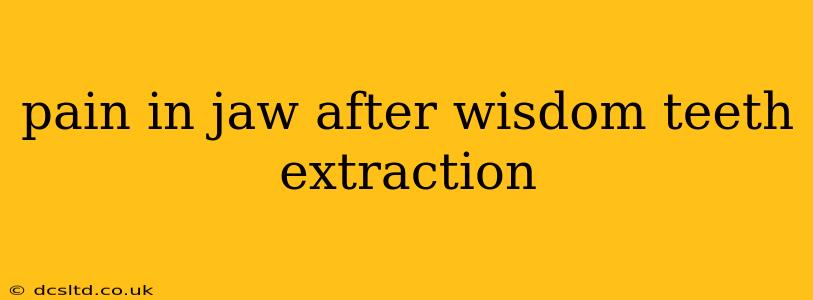Wisdom teeth extractions are common, but the recovery process can be surprisingly complex. Many patients experience jaw pain following the procedure, and understanding its causes, management, and prevention is crucial for a smooth recovery. This comprehensive guide addresses common concerns and offers practical advice.
What Causes Jaw Pain After Wisdom Teeth Extraction?
Jaw pain after wisdom teeth extraction stems from several factors, all related to the surgical trauma and healing process.
- Inflammation: The surgical site becomes inflamed as part of the body's natural healing response. This inflammation can radiate pain to the surrounding jaw muscles and tissues. Swelling further exacerbates this pain.
- Nerve Irritation: The nerves in the jaw area can be temporarily irritated during the extraction process. This irritation manifests as pain, tingling, or numbness, often extending beyond the immediate extraction site.
- Dry Socket: A dreaded complication, a dry socket (alveolar osteitis) occurs when the blood clot protecting the extraction site dislodges or dissolves prematurely. This exposes the bone and nerve endings, causing excruciating pain that often radiates to the jaw.
- Muscle Strain: Opening your mouth wide during the procedure and subsequent discomfort can strain the jaw muscles, leading to pain and stiffness. This is particularly true if you experience difficulty opening your mouth (trismus) after the surgery.
- Infection: Although less common with proper post-operative care, infection can occur at the extraction site, leading to severe pain, swelling, and redness. This can also spread to the jaw.
How Long Does Jaw Pain After Wisdom Teeth Extraction Last?
The duration of jaw pain varies significantly depending on individual factors, the complexity of the extraction, and adherence to post-operative instructions. Generally, you can expect some degree of discomfort for the first few days, gradually decreasing in intensity. Most patients experience significant pain relief within a week. However, mild discomfort or stiffness might persist for several weeks. Severe or persistent pain warrants immediate attention from your dentist or oral surgeon.
What Can I Do to Relieve Jaw Pain After Wisdom Teeth Extraction?
Managing jaw pain effectively requires a multi-pronged approach. Here’s what you can do:
- Medication: Your oral surgeon or dentist will likely prescribe pain medication, usually analgesics or narcotics, to manage post-operative pain. Follow the prescribed dosage carefully.
- Ice Packs: Applying ice packs to the affected area for 15-20 minutes at a time, several times a day, can reduce swelling and pain during the initial stages of recovery.
- Warm Compresses: Once the initial swelling subsides (typically after 2-3 days), warm compresses can help relax the jaw muscles and alleviate stiffness.
- Rest: Adequate rest is essential for healing. Avoid strenuous activities that could increase pain or swelling.
- Soft Foods: Stick to a soft food diet for the first few days to minimize stress on the extraction site. Avoid anything that requires excessive chewing.
- Gentle Rinsing: After 24 hours, gently rinse your mouth with saltwater several times a day to promote healing and prevent infection. Avoid forceful rinsing or spitting.
- Over-the-counter Pain Relievers: Over-the-counter pain relievers such as ibuprofen can help manage mild to moderate pain.
Is Jaw Pain After Wisdom Teeth Extraction Normal?
Yes, some degree of jaw pain is considered normal after wisdom teeth extraction. The extent and duration of pain, however, vary greatly. While mild discomfort is expected, severe, persistent, or worsening pain should be reported to your dentist or oral surgeon immediately. This could indicate a complication such as a dry socket or infection.
When Should I Call My Dentist About Jaw Pain After Wisdom Teeth Extraction?
You should contact your dentist or oral surgeon immediately if you experience:
- Severe, unrelenting pain that isn't controlled by prescribed medication.
- Increased swelling or redness at the extraction site.
- Fever or chills.
- Signs of infection, such as pus or foul odor.
- Difficulty breathing or swallowing.
How Can I Prevent Jaw Pain After Wisdom Teeth Extraction?
While you can’t entirely eliminate the possibility of jaw pain, you can take steps to minimize your risk:
- Follow your dentist's post-operative instructions meticulously. This includes medication, diet, and oral hygiene.
- Avoid smoking, alcohol, and strenuous activity in the immediate post-operative period. These factors can impede healing and increase the risk of complications.
- Communicate openly with your dentist or oral surgeon about any concerns. This helps ensure early detection and management of potential problems.
This information is for general knowledge and does not constitute medical advice. Always consult with your dentist or oral surgeon for any concerns regarding your specific situation. They can provide personalized recommendations based on your individual needs and medical history.
